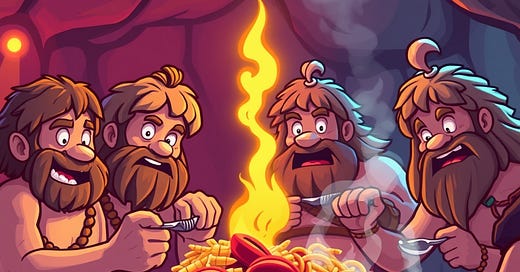Caveman at the Buffet: The Surprising Reason We Overload Our Plates
From caves to restaurants, we’re still fighting the urge to feast like there’s no tomorrow!
So, the other day, I was on a family trip, and like most trips, we decided to treat ourselves to a buffet dinner. You know the kind—endless tables loaded with all kinds of food, from every corner of the world. Now, my family and I love a good buffet. Who doesn’t, right? You get to choose whatever you want, in any amount, guilt-free!
We all grabbed our plates, piled on the food we wanted, and settled down to eat. That’s when I glanced over at my little son’s plate, and I had to stifle a laugh. His plate was packed! I mean, it looked like he’d grabbed everything he could in one go. Curiosity got the better of me, so I asked him, “Are you seriously going to finish all that in one sitting?”
Without skipping a beat, and with a completely straight face, he replied, “I think the food will get over by the time I go for seconds, so I thought why not take it all at once and have fun?”
That response caught me off guard. I mean, is that a smart decision or just, well, a classic kid move? But then I stopped to think—don’t we all do this? Not just at buffets, but even at home? Haven’t we all gone a little overboard, piling our plates high just because it’s there?
Where Does This Thinking Come From?
Here's the thing: As I mulled it over, a lightbulb moment hit me. I was reading a book recently about our human instincts—how some behaviors today are rooted in our ancestral past. And suddenly, my son’s logic made perfect sense.
See, fifty thousand years ago, our ancestors—Homo sapiens, just like us—were stepping out into the world. And trust me, they had a tough time. There was no heating in winter, no air-conditioning in summer. Supermarkets? Ha! Forget about it. They had to hunt or forage for every bit of food they ate, and survival was a full-time job. No classrooms, no hospitals, and definitely no jobs to think about. Life was rough—every day brought the challenge of survival. Sounds wild, right? But it’s true.
Our ancestors weren’t those hunched-over, club-carrying cavemen we see in cartoons. They looked like us, and they were just as smart. The only difference? They didn’t have our modern conveniences. Their opportunities came from their sheer will and hard work, not from fancy schools or connections. And you know what? Their brains were hardwired to survive in a world with danger at every turn. They ate when they could because they never knew when their next meal would be.
The Buffet Example We All Relate To
And this doesn’t just happen at lavish buffet dinners. Picture this: You’re at a family wedding, the biryani looks killer, and the line at the counter is never-ending. You look at your plate and think, Arre, let me pile on a little extra, just in case it gets over later. Classic! It’s that caveman instinct talking—our brain still thinks there’s going to be a scarcity of food, even though you know there’s enough biryani to feed an army!
In fact, if you think about it, this mindset shows up in other ways too. Like when you’re stuck in Mumbai traffic. People cut lanes, squeeze in wherever they can, because there’s always this fear that if you don’t take your chance now, you’ll be stuck forever. It’s the same "scarcity" mindset playing out—better grab what I can, when I can.
Our Minds Are Slow to Adapt
As a species, we’ve progressed in so many ways—technology, education, you name it. But our brains? Still lagging behind like a slow tortoise trying to catch up. They’re stuck in that caveman mode, struggling to adapt to the world we live in today. We’ve got abundance all around us—whether it’s food or opportunities—but our minds are still wired for scarcity.
It’s kind of funny when you think about it. Here we are, walking around with smartphones in our pockets, living in cities, yet deep down, we’re still a little like those cave-dwellers, trying to feast while we can.





